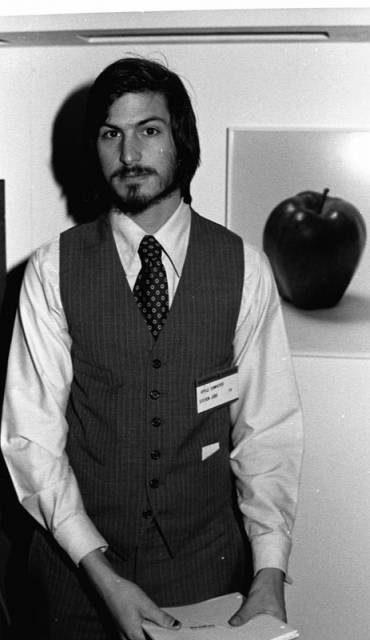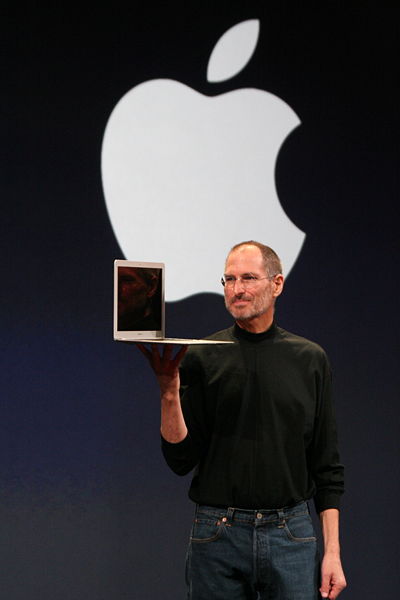Biography
Steven Paul Jobs was born as Abdul Lateef Jandali in San Francisco on February 24, 1955, to two university students, Syrian-born Abdulfattah "John" Jandali, and Joanne Carole Schieble, of Swiss Catholic descent, who were both unmarried at the time. Jandali, who was teaching in Wisconsin when Steve was born, said he had no choice but to put the baby up for adoption because his girlfriend's family objected to their relationship. The baby was adopted at birth by an Armenian-American couple, Paul and Clara Jobs, who named him Steve Jobs.
Jobs was said to have been a problem child in early schooling, often bored by school routine. Fueled by rich opportunities in the bay area, he found an interest in electronics at an early age, including an important exposure to HP. In high school, he met future co-founder of Apple, Steve Wozniak, who was working for HP at the time. Jobs enrolled at Reed College after high school, but dropped out after one semester when he realized his overwhelming interest in electronics. He returned to the bay area to work as a technician for Atari, where he worked on the 1976 arcade video game Breakout.
 I was so young and foolish.
I was so young and foolish.Steve Wozniak built a computer for his own use, and presented it to a home brewed computer club. Jobs saw the computer and recognized the possible applications beyond those of a hobbyist. Jobs convinced Wozniak to become his business partner and Apple Computer was established on April 1st ,1976. They released the Apple II in 1977, and it became a huge success. During its life span, it sold 2 million units and became the standard for personal computing. In early 1980, a public offering of Apple's stock made Steve a multi-millionaire when he was 25.
In 1981, IBM entered the personal computer market. To compete, Jobs poured time and resources in to building the graphical user interface. He perfected the concept of folders and windows as sheets of paper layered on top of it. It debuted in Lisa, an expensive and commercial failure. Wanting to focus his energy on the Macintosh product, he hand-picked John Sculley, a CEO from Pepsi, to run day-to-day operations. Learning from the mistakes of the Lisa product ,Jobs and Wozniak perfect the graphical user interface, and put it in a compact, affordable computer for the masses. The Macintosh launched in January 24th, 1984.
Internal power struggles at Apple led the board to choose Sculley's direction for Apple, which focused on higher margin and less spending in R&D. Steve, upset at the decision, sold all but one of his shares of Apple Computer. Jobs claims that Sculley destroyed what he spent 15 years of his life building.
 My computers are sexy.
My computers are sexy.Jobs later purchased a digital image computing firm from Lucas Films for $5 million, and later named it Pixar. He also created a computer system called Next and began to work on a high-end computer system far more advanced than anything found on the Macintosh. Next developed an easy programing tool, and created a small but loyal following. In fact the man who invented the World Wide Web did so on a Next computer.
In 1996, Apple's market share was in steady decline. They were on the verge of bankruptcy. Windows 95 added stiff competition and Apple knew it needed a new OS. They bought Next for $400 million dollars, and in the process brought Jobs back to Apple after an 11 year absence. Soon after, Steve Jobs became the new CEO of Apple computing. In early 2000 they released Mac OS X: a refined, more user-friendly version of the Next OS. Steve released elegant computer designs including the iMac and iBook that brought life and simplicity back into Apple's computer line up.
 I created the iPhone, have you heard of it?
I created the iPhone, have you heard of it?Perhaps Steve's greatest recent success is that of the iPod, launched in 2001. Having sold over 100 million units, it garnered about 75% of the market as of 2006. The iPod also spurs sales on Apples iTunes store that has sold billions of songs. The success of the iPod has created a halo effect for the Macintosh platform. The iPhone, Steve's newest device, received the Timestop Invention of 2007 award and fuels the creativity and success at Apple.
Steve Jobs and his life at Apple Computer exemplify early triumphs, an eventual tragedy, and ultimately a success story highlighted by an intense inner-drive. From a start up company operating out of his garage he built a company worth million of dollars, and helped create the home computer market. Driven by innovation and insistence on excellence, Macintosh was born. In a board room maneuver all was lost and his company was taken from him. But it languished without his guidance. Jobs never let up and continued to notch important successes while away from Apple. His triumphant return to Apple signaled a new beginning for the company and launched it into an upward spiral of success.
Health Concerns
In October 2003, Steve Jobs was diagnosed with a less aggressive form of pancreatic cancer. In 2004 he released a company-wide email disclosing the situation, to put rampant speculation to rest. The cancer was successfully treated later that year. However, this was the first time people began to question, "What would happen to Apple if Steve was gone." Investors were worried, and stock prices dropped.
 I'm Thin, not Dead
I'm Thin, not DeadQuestions of Steve's health arose again at Apple's 2006 WWDC (World Wide Developers Conference). Steve looked extremely thin during the keynote. He also left the stage for large portions of the presentations, leaving the heavy lifting to Scott Forthstall and Phil Schiller. Apple PR claimed it was because Steve was a strict vegetarian, and that his health was good. After 2008's WWDC rumors of Steve's ailing health resurfaced, Apple's PR claimed it was a common bug, and nothing to be alarmed about. At 2008's Let's Rock event, where Apple launched a new line of iPods, he opened up his keynote poking a jab at the media. The first frame of his keynote speech said "Reports of my death are greatly exaggerated."
In December of 2008 Steve Jobs health issues caused him to take a six month leave-of-absence. Steve and Apple claimed it was from a hormonal imbalance that wasn't letting his body absorb the nutrition from the food that he ate. He was expected to return to Apple in June. In April 2009, during his leave of absence Jobs had a liver transplant at the Methodist University Hospital Institute in Memphis Tennessee. As promised, Steve returned to Apple in late June, shortly after the release of the iPhone 3GS. A year and a half later, on January 17, 2011 Apple announced that he would be taking a medical leave-of-absence so that he could focus on his health. They also announced that Tim Cook would be running the company during his time away, but that Jobs would remain as CEO.
Retiring and Passing
 The loss of a visionary
The loss of a visionaryOn August 24, 2011 Jobs formally resigned as CEO of Apple Inc. He explained that he felt that he could "no longer meet [his] duties and expectations as Apple's CEO." Tim Cook was appointed as his successor.
Steve Jobs passed away on October 5, 2011, at the age of 56.
Log in to comment